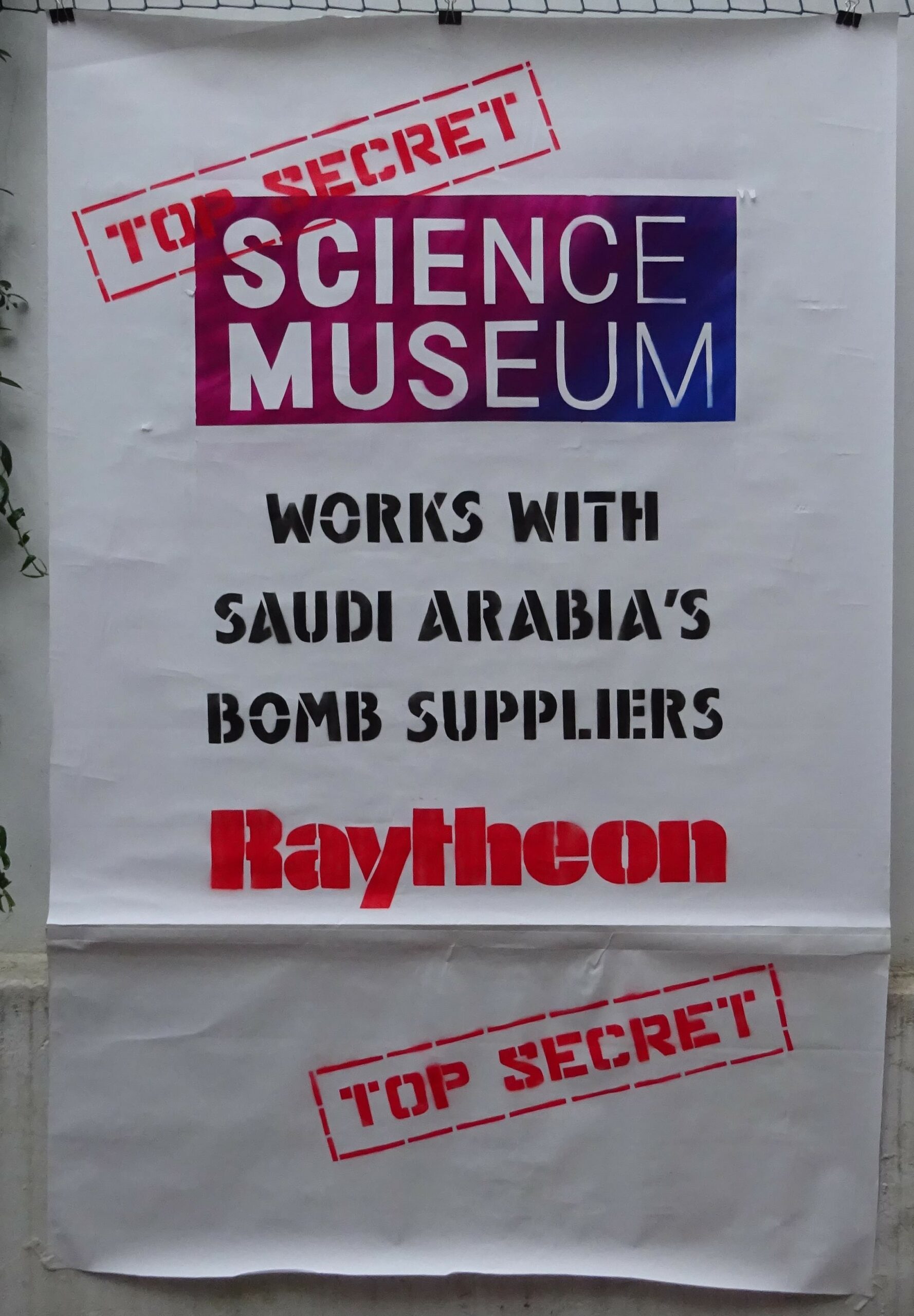
Increasingly, arms companies are sponsoring public events and spaces in order to boost their profiles and increase their profits. This has caused artists and performers to take action and demand better. In this blog, a member of the Protest Stencil art collective explains why they removed their work from the Science Museum in London.
Last week a new exhibition opened at the Science Museum in London, just in time for the summer holidays. One of our posters was going to be in the show, but we’ve had to pull out. Here’s why…
Back in March, the Science Museum got in touch saying they were planning an exhibition about data and data breaches. They asked if they could have one of our Facebook adhack posters from last year, “Data misuse is not our friend, it’s our business model”. Those posters got a lot of attention, so it wasn’t surprising the Science Museum had heard about them.
We agreed, and got on with making the poster, thinking it was for some exhibition about the perils of social media and data capture. We chatted with people about it, boasted about it if we’re honest. It’s quite flattering to be asked to make art for a national museum. Something to tell your mum about. It’s easy to see how people get drawn in to collaborating with big institutions.
Once the poster was made, we were going to upload a photo of it to social media, as a sort of teaser, ‘look out for this at the Science Museum’. That’s when it all started to go wrong. We had a quick look online to see what other people had already posted about the show.
On twitter, the first tweet that stood out was from Raytheon, the arms manufacturer, about how they’re supporting the exhibition. Raytheon is one of the world’s biggest weapons makers. It supplies Saudi Arabia with missiles that it uses in attacks on civilians in Yemen. In November last year, we marked Remembrance Sunday with a set of posters about how the UK shouldn’t be supplying arms to regimes like Saudi Arabia and Israel – states who use those weapons on civilian populations in Yemen and Palestine. Just last month, the Court of Appeal ruled that UK arms sales to Saudi Arabia are unlawful.
After that first…er…bombshell, what next? Well it turns out the exhibition isn’t what we thought at all. It’s a celebration of 100 years of GCHQ, the government surveillance agency found to be illegally spying on Amnesty International and engaged in mass surveillance on us all. If we’d kept up with royal news more, we’d have known that the Queen announced the exhibition on a visit to the Science Museum in March.
The more we looked into it, the more we saw an exhibition sponsored by a whole range of companies linked to the arms trade and the murky world of state surveillance, within a dubious framing of ‘this-is-how-we-keep-you-safe’. Why would anyone want to be involved in this?
Of course, it’s obvious why arms makers would want to work with prestigious national museums – artwashing. This tactic has long been used by the arms trade, oil companies and others to distract from their involvement in war crimes, human rights abuses and climate catastrophe. Indeed, artists have recently protested against BP’s attempts to cleanse its own image by associating itself with the National Portrait Gallery.
We won’t be part of this kind of artwashing. Instead, we’ve decided to offer our artwork for auction at Art The Arms Fair, to raise money for Campaign Against the Arms Trade. They’re organising protests against DSEI, the biennial arms fair due to be held at ExCeL London later this year. Raytheon and their like will be there, flogging their wares.
Funnily enough, we’ve had work on display at the Science Museum before. Back in 2016, the museum hosted a reception dinner for the Farnborough arms fair. We collaborated on creating a drone shadowoutside the museum, a reminder that around the world, some people live under the constant threat of drone attacks. Maybe we’ll stick to making art for the streets. In any case, we hope other artists will also choose not to lend their work to exhibitions that normalise such death and destruction.
You can see more of Protest Stencil’s work at https://www.instagram.com/ProtestStencil/ .

